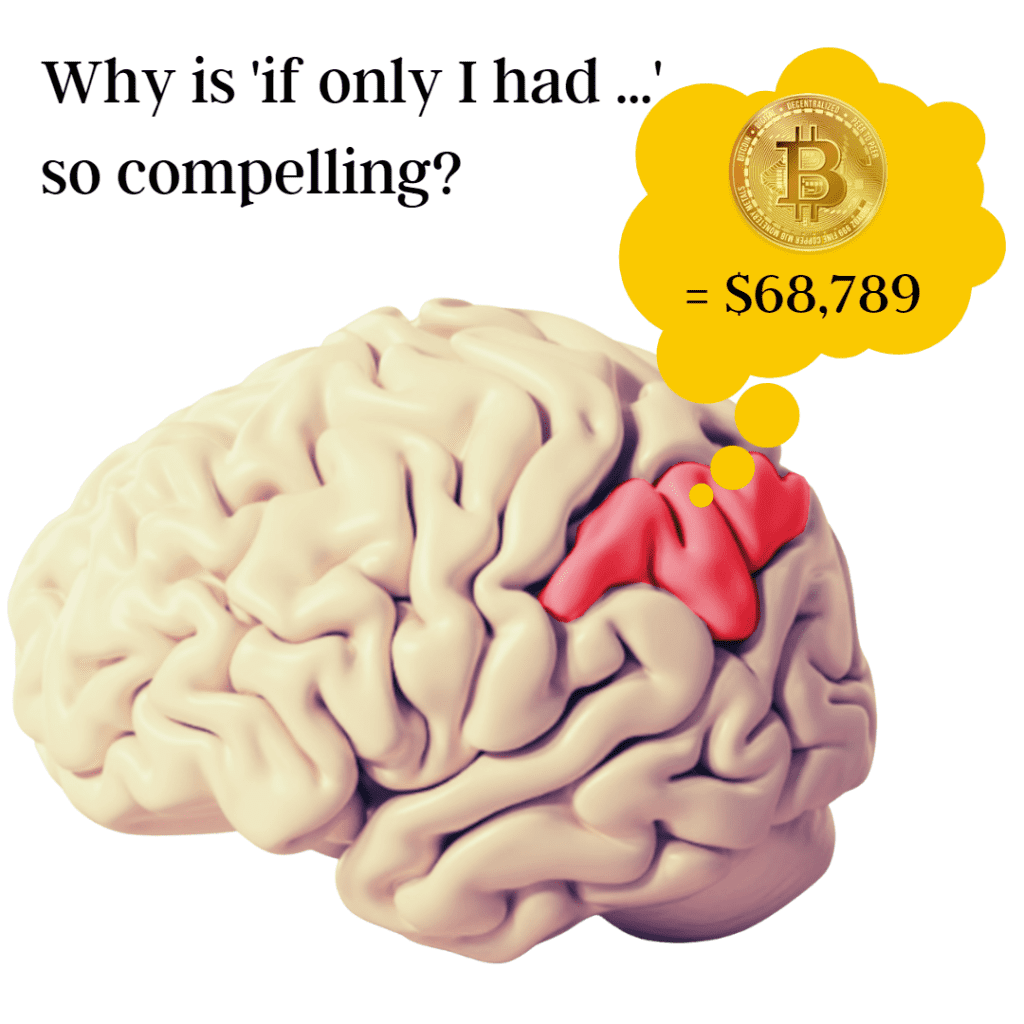
He’s Got More Than Me (And He Shouldn’t Have)
25 May 2022
Critical Inner Voice? It’s Worse Than Useless
30 May 2022
(I didn’t, but I could have)
Obsessing over recovering losses, being preoccupied with regret, and cycling between fear and denial are far from ideal states.
It’s over
Focusing on what cannot respond to your wishes – no matter how much energy you put into it – is exhausting. This is what happens when we want a lover who has left us to come back, when we want our bodies to be taller, shorter, younger or different proportions, and it’s what happens when we long for the past to come back, so that we can have another chance to get things right.
You know that what’s done is done. You tell yourself this day after day, and so does everyone else. Yet these counterproductive feelings still get a hold over you, sapping your energy and blinding you to new opportunities.
Emotions want us to do something
Lisa Feldman-Barratt proposes that emotions are goal-directed. They are trying to get the body into action, trying to get you to do something. More precisely, emotions are constructed from concepts (as well as bodily state, context and past experience) and those concepts are goal-orientated. For example, they might direct us towards finding love, or be included, or they might motivate us to withdraw from an uncomfortable situation. Anger might get us into action, or as Feldman-Barratt writes,
In our culture, one goal in “Anger” is to overcome an obstacle that someone blameworthy has put in your path.
p. 100 ‘How Emotions Are Made: The Secret Life of the Brain’
Regrets, losses and sorrow over what might have been, are emotions related to the past, and they would have you believe that you need to change or undo the past to get free of them.
Don’t you need to learn from mistakes?
If there are lessons you need to learn from a mistake, they can be written down on a piece of paper, or added to your calendar so that you don’t forget them.
Feeling that you must learn from the mistake is an artful mental ploy to keep you stuck; its intention is your survival and betterment, but it’s using an outdated concept that tells you if you torture yourself enough, you will be redeemed. If you think this sounds a little far-fetched, consider the impact of a preoccupation with regret and self admonishment on a person’s life. It increases suffering, and focusing on imaginary badness and mistakes makes them more likely to repeat them, not less.
Regret has no value, no matter how much it tries to convince you otherwise. There’s no suggestion to not feel it, or make it a ‘bad’ emotion. That would be ridiculous. Just don’t believe it has the transformational power that it claims as its reason for being.
Traumatic events get stuck
PTSD as a phenomenon was discovered when soldiers came back from the First World War, and felt and acted as if they were still in extreme danger. Back then, it was called ‘shell shock’. It became clear that something in their mind/body system hadn’t updated, and hadn’t been able to experience any relief from them being finally out of a horrific situation. No matter where their body was, or whom it was with, they continued to suffer the terror of the trenches.
People living with residual trauma are continually getting ready for the next attack or life-altering event. When someone is preoccupied with a real or imagined threat, the resulting fear, rage or disappointment will be reflected in the body.
When Trauma Get Stuck in the Body – Psychology Today
One way of thinking about it is to say that traumatic events are too overwhelming and too frightening to be processed in the normal way. Our minds have a habit of remembering the very worst of it with the greatest clarity – and forgetting the moment we reached safety and subsequent relief.
Could a bad decision be a trauma?
This is how I would describe my own experience. The aftermath had all the hallmarks of an event that couldn’t be processed by the mind: obsession, self blaming, depression, panic and a relentless and increasingly barmy search for a way to undo what I thought I’d done, to get back what I’d lost.
If a decision has put you in danger, and you can’t get beyond it, it’s useful to think of it in terms of trauma. The danger may not have been physical, but if it threatens your sense of self, your relationships and your financial survival, it’s not too far-fetched to say that it could have a similar impact as a physical threat. Perceiving disastrous decisions as trauma opens up many possibilities for moving beyond what’s happened.
If you played the roles of both perpetrator and victim, this only adds to the misery and feeling of helplessness.
Once the mind gets that the past really is the past, it can stop producing emotion to change it
Modern trauma treatments (Peter Levine, Bessel Van De Kolk and Stephen Porges) focus on the body as well as the mind. They use a combination of cognitive understanding of how the body and mind reacts during and after traumatic events and physical release of the trauma, such as shaking, making sounds and completing actions you wanted or needed to make at the time.
What they don’t do is go back into the trauma, or have you re-experience it in any way.
The aim of treatment is that your whole body and mind knows that it’s over. It’s completed and done. You don’t have to forgive anyone, you don’t have to like what’s happened. You just need to know that it’s over, and you’ve lived to tell the tale.
It’ over, it’s finished what’s been lost is gone
Once this has sunk in, there is no need for the thoughts and feelings about the event to keep repeating. It’s finished. Remembering that emotions are goal directed, it makes sense that your mind will stop producing emotions to get you into action to change the past once it has wholly understood that there is nothing to be done. It’s over.
Which brings us back to the illustration. How many people are holding their Bitcoin because August 2021 and their account balance at that time has made a powerful imprint on their minds? In this case, they will be holding because a part of them is stuck back there, and can’t move beyond it. Wishful thinking takes over, along with daydreams of how it would have been if they had sold. If only ….
Holding might be a good decision. No one knows. But being motivated by what’s not possible, by imagining the past will repeat itself, and you’ll be able to get it right next time is not an easy place to be.



